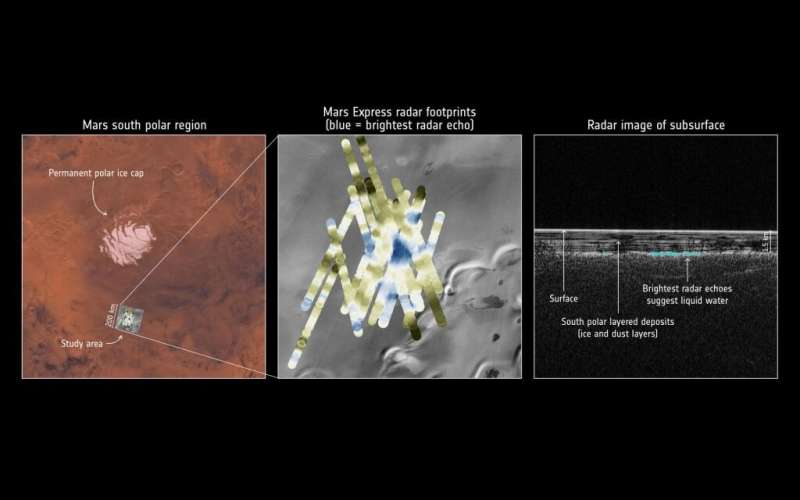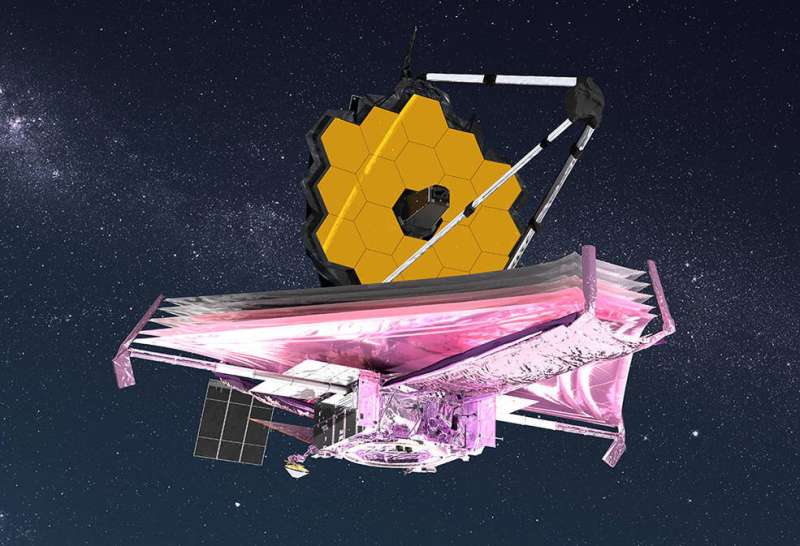
Copernical Team
Hubble sheds light on origins of supermassive black holes
 Astronomers have identified a rapidly growing black hole in the early universe that is considered a crucial "missing link" between young star-forming galaxies and the first supermassive black holes. They used data from NASA's Hubble Space Telescope to make this discovery.
Until now, the monster, nicknamed GNz7q, had been lurking unnoticed in one of the best-studied areas of the night sky,
Astronomers have identified a rapidly growing black hole in the early universe that is considered a crucial "missing link" between young star-forming galaxies and the first supermassive black holes. They used data from NASA's Hubble Space Telescope to make this discovery.
Until now, the monster, nicknamed GNz7q, had been lurking unnoticed in one of the best-studied areas of the night sky, Breaking news from the dawn of the universe
 An international effort led by astrophysicists at the Niels Bohr Institute, University of Copenhagen, and the Technical University of Denmark, have identified a distant object with properties that lie in-between those of a galaxy and those of a so-called quasar. The object can be seen as the ancestor of a supermassive black hole, and it was born relatively soon after the Big Bang. Simulations ha
An international effort led by astrophysicists at the Niels Bohr Institute, University of Copenhagen, and the Technical University of Denmark, have identified a distant object with properties that lie in-between those of a galaxy and those of a so-called quasar. The object can be seen as the ancestor of a supermassive black hole, and it was born relatively soon after the Big Bang. Simulations ha Digging into drill data takes perseverance
 Drilling is on hold while the rover focuses on driving, so the sampling team is off studying the data we have acquired so far. What kind of information do we get from the drill, and how do the rocks we have drilled so far compare to each other?
One of the first things we look at is how difficult it was for the drill to make progress through the rock. The rover has a rotary percussive drill
Drilling is on hold while the rover focuses on driving, so the sampling team is off studying the data we have acquired so far. What kind of information do we get from the drill, and how do the rocks we have drilled so far compare to each other?
One of the first things we look at is how difficult it was for the drill to make progress through the rock. The rover has a rotary percussive drill New tests evaluate mission readiness of astronauts upon landing
 Have you ever felt off-balance after being on amusement rides or gotten motion sickness on a boat? Astronauts feel something similar that can be more intense when they return to Earth from space.
Once they land, their whole body - including muscles, bones, inner ear, and organs - starts readjusting to Earth's gravity. Astronauts often report feeling dizzy, lightheaded, nauseated, and off-b
Have you ever felt off-balance after being on amusement rides or gotten motion sickness on a boat? Astronauts feel something similar that can be more intense when they return to Earth from space.
Once they land, their whole body - including muscles, bones, inner ear, and organs - starts readjusting to Earth's gravity. Astronauts often report feeling dizzy, lightheaded, nauseated, and off-b NASA sets coverage for Russian spacewalks
 NASA will provide coverage of spacewalks Monday, April 18, and Thursday, April 28, as Russian cosmonauts venture outside the International Space Station to activate a new robotic arm attached to the Nauka module.
Coverage for both spacewalks will begin at 10 a.m. EDT each day on NASA Television, the NASA app, and agency's website. Each spacewalk is scheduled to begin around 10:25 a.m.
NASA will provide coverage of spacewalks Monday, April 18, and Thursday, April 28, as Russian cosmonauts venture outside the International Space Station to activate a new robotic arm attached to the Nauka module.
Coverage for both spacewalks will begin at 10 a.m. EDT each day on NASA Television, the NASA app, and agency's website. Each spacewalk is scheduled to begin around 10:25 a.m. Artemis astronauts will ride in style in new crew transportation vehicles
 When astronauts leave their crew quarters at NASA's Kennedy Space Center in Florida for their lunar mission, NASA's Artemis II crew will ride in a new set of wheels: A fleet of shiny crew transportation vehicles provided by Canoo Technologies Inc., will take them to Launch Pad 39B for their historic ride aboard the Space Launch System rocket and Orion spacecraft.
The fleet will consist of
When astronauts leave their crew quarters at NASA's Kennedy Space Center in Florida for their lunar mission, NASA's Artemis II crew will ride in a new set of wheels: A fleet of shiny crew transportation vehicles provided by Canoo Technologies Inc., will take them to Launch Pad 39B for their historic ride aboard the Space Launch System rocket and Orion spacecraft.
The fleet will consist of Astra announces electric propulsion system contract with LeoStella
 Astra Space, Inc. (Nasdaq: ASTR) and LeoStella LLC ("LeoStella") has announced a contract for Astra to provide multiple Astra Spacecraft Engines for LeoStella satellites. Astra is expected to begin delivering the propulsion systems later this year and into 2023.
LeoStella designs and manufactures operational satellites cost effectively and at scale. Astra's Spacecraft Engine has demonstrat
Astra Space, Inc. (Nasdaq: ASTR) and LeoStella LLC ("LeoStella") has announced a contract for Astra to provide multiple Astra Spacecraft Engines for LeoStella satellites. Astra is expected to begin delivering the propulsion systems later this year and into 2023.
LeoStella designs and manufactures operational satellites cost effectively and at scale. Astra's Spacecraft Engine has demonstrat European Space Agency stops cooperation with Russian lunar missions
 The European Space Agency on Wednesday ended cooperation with Russia on three missions to the Moon due to Moscow's invasion of Ukraine, following a previous decision to do the same for a Mars mission.
The ESA said it would "discontinue cooperative activities" on Luna-25, 26 and 27, a series of Russian lunar missions on which the European agency had aimed to test new equipment and technology.
The European Space Agency on Wednesday ended cooperation with Russia on three missions to the Moon due to Moscow's invasion of Ukraine, following a previous decision to do the same for a Mars mission.
The ESA said it would "discontinue cooperative activities" on Luna-25, 26 and 27, a series of Russian lunar missions on which the European agency had aimed to test new equipment and technology. Mars astronauts will create fuel by having a shower

When astronauts begin exploring Mars, they will face numerous challenges. Aside from the time and energy it takes to get there and all the health risks that come with long-duration missions in space, there are also the hazards of the Martian environment itself. These include Mars' incredibly thin and toxic and toxic atmosphere, the high levels of radiation the planet is exposed to, and the fact that the surface is extremely cold and drier than the driest deserts on Earth.
As a result, missions to Mars will need to leverage local resources to provide all the basic necessities, a process known as In-Situ Resource Utilization (ISRU).
James Webb telescope's coldest instrument reaches operating temperature

NASA's James Webb Space Telescope will see the first galaxies to form after the Big Bang, but to do that, its instruments first need to get cold—really cold. On April 7, Webb's Mid-Infrared Instrument (MIRI)—a joint development by NASA and ESA (European Space Agency)—reached its final operating temperature below 7 kelvins (minus 447 degrees Fahrenheit, or minus 266 degrees Celsius).

